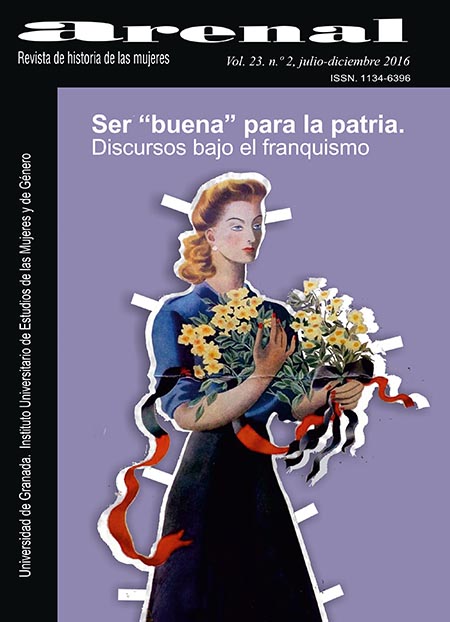Porque te vi llorar or the sentimental education of the postwar Spain
DOI:
https://doi.org/10.30827/arenal.v23i2.3125Keywords:
Cinema, Orduña, Traditional roles and model representation, Gender.Abstract
The film has been used as a vehicle of indoctrination and ideology of the population by totalitarian states. In the Spain of the post-war period, with the country in reconstruction, the foundations of the state using all kinds of measures are established and the film will be one of them. The film Because I saw you cry (Juan de Orduña,1942), produced by Cifesa, it presents the beginnings of moralizing ideals through the story, with a mixture of regionalism that years later will be colored by the Franco regime. It set in northern Asturias (Llanes), reflecting a strong regional identity. The simple narrative construction full of symbolic references, contrasting the two Spains encountered at the beginning and the protagonists supposedly exemplary values. Traditional roles serve pattern underlying representation and foundation of social functioning essentially of women to almost the present, asymmetric and oppressive relations.
Downloads
References
AGULLÓ DÍAZ, Mª del Carmen. Azul y rosa: franquismo y educación femenina, en "Estudios sobre la política educativa durante el franquismo", coordinado por Alejandro Mayordomo. Universidad de Valencia, pp.243-295. 1999.
AMADOR CARRETERO, Mª Pilar. “La sexualidad en el cine español durante el primer franquismo”. Fotocinema. Revista Científica de Cine y Fotografía. Nº 1. Málaga. 2010. DOI: https://doi.org/10.24310/Fotocinema.2010.v0i1.5848
BRAGA CORRAL, Héctor. “Etnomusicología y cine. Investigaciones recientes en Asturias”. Revista Cuadernos de Etnomusicología. Sibe. Nº3 Marzo. 2013
BUTRÓN, Gonzalo. “Una mujer como Dios manda: el arquetipo femenino del franquismo y el cine de García Berlanga”. Ubi sunt: Revista de Historia, 21, pp. 72-80. 2007.
CÁNOVAS ORTEGA, Mª del Carmen. “La construcción de la moral social franquista a través del cine y la crítica cinematográfica durante el primer franquismo (1940-1945)”. I Encuentro de Jóvenes Investigadores en Historia Contemporánea de la Asociación de Historia Contemporánea: Zaragoza. Zaragoza: Prensas Universitarias de Zaragoza. 2008.
DELTELL ESCOLAR, Luis. “La construcción del lenguaje del franquismo: el creador anónimo (1945-1955)”. El productor y la producción en la industria cinematográfica. Coord. MARZAL FELICI, Javier y GÓMEZ TARÍN, Fco. Javier. Madrid. Editorial Complutense. 2009.
GARCÍA BARRIENTOS, José Luis. Drama y tiempo: dramatología I. Madrid: C.S.I.C. 1991.
GIL GASCÓN, Fátima y GÓMEZ GARCÍA, Salvador. “Mujer, noviazgo y censura en el cine español 1939-1959”. Revista Latina de Comunicación Social, 65. La Laguna (Tenerife): Universidad de La Laguna, 460-471. 2010. DOI: https://doi.org/10.4185/RLCS-65-2010-912-460-471
GUSTRÁN LOSCOS, Carmina. “La Guerra Civil en el cine del franquismo. Visiones contrapuestas”. VI Encuentro de investigadores sobre el franquismo: Zaragoza, 402-416. Comisiones Obreras, CCOO. 2006.
GUTIÉRREZ SAN MIGUEL, Begoña. Teoría de la narración audiovisual. Madrid: Cátedra. Col. Signo e Imagen. 2006.
MARTÍNEZ, Josefina. “Del rojo al azul. Las pantallas de las dos Españas”. Espacio, Tiempo y Forma, 117. UNED. Serie V, Historia Contemporánea, t. 21. 2009. DOI: https://doi.org/10.5944/etfv.21.2009.1532
NOËLLENEUMANN, Elisabeth. La espiral del silencio. Opinión pública: nuestra piel social. Barcelona, Paidós. 1995.
ORTIZ HERAS, Manuel. “Mujer y dictadura franquista”. Aposta. Revista de Ciencias Sociales. N. 28. 2006.
http://www.apostadigital.com/revistav3/hemeroteca/ortizheras.pdf Consultado el 10/04/2014
SÁNCHEZ BIOSCA, Vicente. “Iconografía del miedo: el cine y el" terror rojo””. Retoricas del miedo imágenes de la Guerra Civil Española, estudios reunidos por BERTHIER, Nancy y SÁNCHEZ BIOSCA, Vicente. Madrid. Universidad Paris Est-Marne la Vallée. Casa de Velázquez. 2012.
STAEHLIN, Carlos. Teoría fundamental del cine. Valladolid: Servicio Publicaciones Universidad de Valladolid 1982.
Downloads
Additional Files
Published
How to Cite
Issue
Section
License
Copyright (c) 2016 Begoña Gutiérrez San Miguel

This work is licensed under a Creative Commons Attribution-NonCommercial-NoDerivatives 4.0 International License.
Los/as autores/as que publican en esta revista están de acuerdo con los siguientes términos:
Los autores/as conservarán sus derechos de autor y garantizarán a la revista el derecho de primera publicación de su obra, el cuál estará simultáneamente sujeto a la Licencia de reconocimiento de Creative Commons 4.0 BY-NC-ND que permite a terceros compartir la obra siempre que se indique su autor y su primera publicación esta revista.
Los autores/as podrán adoptar otros acuerdos de licencia no exclusiva de distribución de la versión de la obra publicada (p. ej.: depositarla en un archivo telemático institucional o publicarla en un volumen monográfico) siempre que se indique la publicación inicial en esta revista.
Se permite y recomienda a los autores/as difundir su obra a través de Internet (p. ej.: en archivos telemáticos institucionales o en su página web) antes y durante el proceso de envío, lo cual puede producir intercambios interesantes y aumentar las citas de la obra publicada. (Véase El efecto del acceso abierto).














